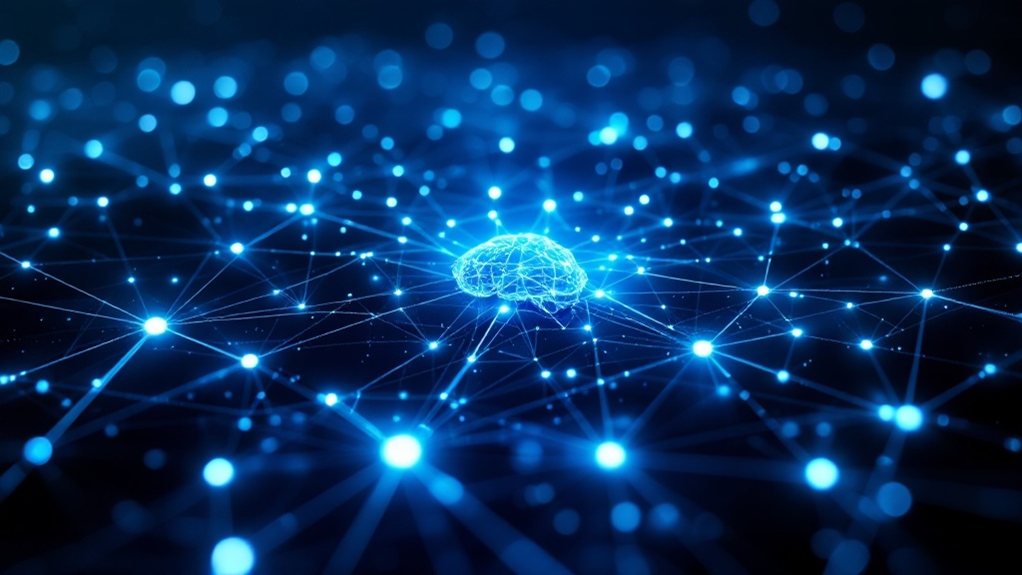Artificial intelligence isn’t just another tech buzzword – it’s reshaping everything. The global AI market is exploding, projected to hit $1.81 trillion by 2030 while growing at a mind-boggling 40% annually. It’s boosting business productivity, creating more jobs than it eliminates, and revolutionizing industries from healthcare to retail. Sure, some people still don’t trust AI, but with 35% of businesses already embracing it, staying competitive means understanding its impact. The future’s knocking – loudly.

Every business leader worth their salt is jumping on the AI bandwagon – and for good reason. The global AI market is barreling toward a mind-boggling $1.81 trillion by 2030. That’s not pocket change. And with AI boosting business productivity by 40%, it’s no wonder that nine out of ten leading organizations are throwing their money at this technology. Let’s face it: adapt or die.
AI isn’t just a trend – it’s a $1.81 trillion tidal wave reshaping business. Either ride it or drown.
The numbers don’t lie. AI’s growing at a breakneck pace of 40% annually, and it’s set to pump a whopping $15.7 trillion into the global economy by 2030. Already, 35% of businesses have embraced AI, with more than half using it to charm their customers and nearly half crunching big data like there’s no tomorrow. It’s not rocket science – it’s just good business. The banking industry is expecting revenue gains of $1 billion in the next three years through AI technology. The success of modern AI systems depends heavily on quality data training to achieve optimal performance.
But here’s where it gets interesting. All those doomsday predictions about robots stealing our jobs? Well, they’re half right. By 2025, AI might kick 85 million jobs to the curb, but hold your horses – it’s also creating 97 million new ones. Do the math: that’s a net gain of 12 million jobs. Not too shabby for a technology that some people still eye with suspicion. AI is revolutionizing healthcare by enabling early disease detection through advanced diagnostic capabilities.
Speaking of suspicion, consumers are finally warming up to AI. Half of them are actually optimistic about it now, and 62% are willing to hand over their data for better experiences. Sure, only 28% fully trust AI, but hey, Rome wasn’t built in a day.
The real kicker? AI isn’t just some fancy toy for tech companies anymore. It’s revolutionizing everything from healthcare to retail. Sixty-eight percent of healthcare organizations are using it, and marketers are seeing their leads jump by 50%.
The retail industry’s leading the charge, proving that AI isn’t just about robots and sci-fi fantasies – it’s about cold, hard cash and competitive advantage. In this game, sitting on the sidelines isn’t an option. It’s evolve or evaporate.
Frequently Asked Questions
How Does AI Impact Personal Privacy and Data Security?
AI poses major threats to privacy and data security. It collects massive amounts of personal information – often without people knowing.
The systems track behaviors, preferences, and patterns, making predictions about everything from shopping habits to health conditions.
Facial recognition and surveillance capabilities are particularly concerning. While regulations like GDPR try to help, AI’s ability to gather and analyze intimate details keeps expanding.
Pretty creepy stuff.
Can Artificial Intelligence Completely Replace Human Jobs in the Future?
While AI will drastically reshape employment, complete human replacement isn’t likely.
Sure, it’ll wipe out about 800 million jobs by 2030 – brutal stats.
But here’s the flip side: AI’s creating new roles too, about 97 million across 26 countries by 2025.
Some jobs will vanish, others will transform.
Humans still excel at creativity, emotional intelligence, and complex decision-making.
Machines can’t match that – yet.
What Are the Ethical Concerns Surrounding AI Decision-Making Processes?
Ethical concerns around AI decision-making are complex and deeply troubling.
Bias runs rampant – just look at Amazon’s recruiting disaster that favored men.
Privacy? Gone, as AI hoovers up personal data like a vacuum gone wild.
Transparency is often non-existent, with algorithms acting as mysterious black boxes.
The stakes are high in healthcare and warfare, where AI choices can literally mean life or death.
Who’s accountable when things go wrong? Nobody seems to know.
How Long Will It Take for AI to Achieve Human-Level Intelligence?
Nobody knows for sure – and that’s the honest truth.
Experts are all over the map with their predictions. Metaculus thinks AGI could hit by 2040, while Shane Legg bets on 2028. Most AI researchers place their bets on the 2060s for human-level AI.
Recent breakthroughs have shortened these timelines, but predicting AI development is like forecasting the weather – complex and full of surprises.
What Regulations Currently Exist to Control AI Development and Implementation?
AI regulation is still playing catch-up.
States are taking the lead with consumer protection laws, requiring AI transparency and disclosure – especially for chatbots and high-risk systems.
Privacy laws are popping up everywhere, with Delaware and Iowa joining the party in 2025.
Environmental concerns aren’t ignored either – California and Massachusetts are cracking down on AI data centers’ energy usage.
Federal policy? Coming soon, supposedly by July 2025.









